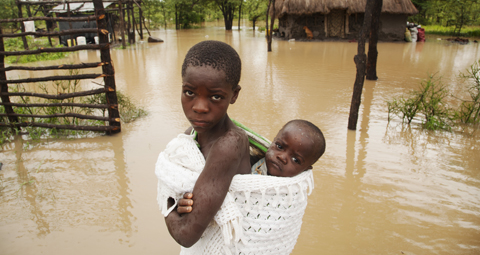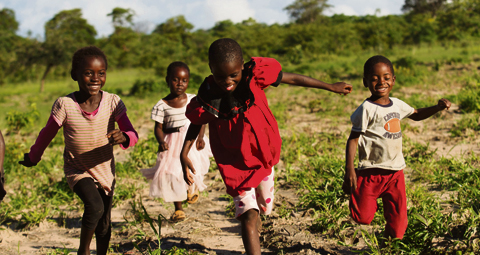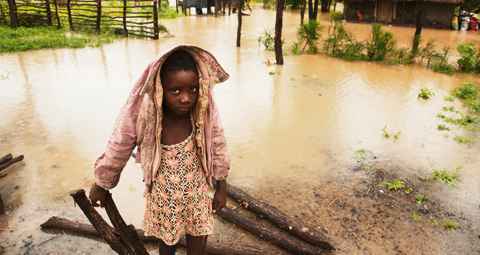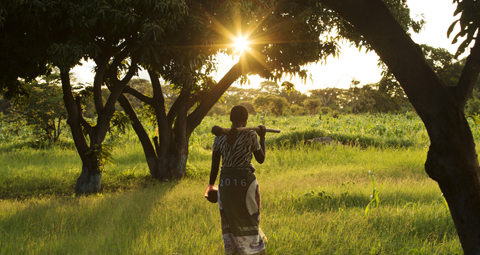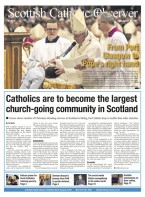BY Ian Dunn | March 3 | ![]() 0 COMMENTS
0 COMMENTS ![]() print
print
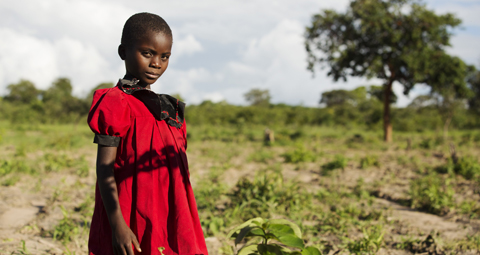
Saving zambian lives by sharing knowledge
Reporting from Zambia, SCO editor IAN DUNN investigates the work of the Scottish Catholic International Aid Fund (SCIAF), and finds the charity’s efforts spreading farming techniques is helping the country overcome its reliance on the copper trade
You see them on every major road in Zambia. Huge, flat bed trucks rumbling south, short dense piles squatting on the back, draped in grubby tarpaulin. The piles are copper, and the trucks are always moving, taking their cargo from the huge mines in the north of Zambia thousands of miles down through Botswana, Zimbabwe, and South Africa. The truck drivers stop and stumble from their cabs at Africa’s southernmost edge but the copper will keep going.
Loaded onto huge container ships, much will of it will roll across the India Ocean and end up in China. There it is processed and much of it will end up in mobile phones, which are sold all over the world.
Copper is a light but incredibly efficient conductor of electricity that makes is ideal for smartphones. If you are reading this on a phone about 12 per cent of the weight will be copper.
Zambia is one the world’s largest producers of copper, and the trade is worth billions. Yet among the villages of straw huts and mud walls where 70 per cent of the population still live there is no sign of that wealth.
“Zambia is cursed by copper,” the former acting president of the country Guy Scott tells me. The 84-year-old is frail but verbose as he reflects on the troubles of his homeland.
He was born here to Scottish parents, and a lifelong political animal, he became first vice president and then briefly acting president, the first white person to lead an Africa country since the end of Apartheid. “Copper, that’s the disease,” he said, “It’s the same think that happened in Scotland: you discover North Sea oil and the rest of the economy went down the tubes. You don’t have to manufacture or grow anything else. And then you’re dependant on it.”
Fr Leonard Chiti, a charismatic Zambian Jesuit, and an outspoken critic of the government, also says copper is not the blessing it would seem.
“The curse of copper!” he said. “It generates 80 per cent of the country’s income but only employs a small number of local people. The wealth of the country is not shared.”
“We have so many resources but that does not translate to decent living standard for the majority,” he said. “Basically, our governments have not had the right priorities throughout history. They have not done enough to create wealth and jobs, to work for a decent standard of living for everyone.”
Fr Chiti is the director of the Jesuit Centre for Theological Reflection (JCTR), a partner of SCIAF that campaigns in Zambia for better governance, better standards of living and better farming.
“Agriculture is key,” he said. “This is a fertile country: if you improve agriculture here, make it a driver of the economy, things will change.”
Among JCTR’s projects in the country is a special college that teaches Zambian farmers new techniques that focus on sustainable, organic farming. This is a key part of SCIAF’s operation in the country. Through partnerships with local organisations, often connected to the Church, they engage with small groups of farmers to try and instill better, more effective methods. 85 per cent of Zambia’s 16 million people are involved in agriculture in some way.
Rosemary Milano is one of them. She lives in the small village of Shelen near the Zimbabwe border. 59, a grandmother, she talks calmly about a level of personal tragedy that is unimaginable in Scotland.
“I have one daughter, and four grand children,” she said. “My daughter is disabled; her left leg has withered. Since my husband died of Malaria seven years ago I have to look after all of them.”
Through Caritas Livingston, a local agency of the Catholic Church and partner of SCIAF, she was selected for help. She was trained in new methods of farming, received new methods of training.
“My land produces four times as much maize as before,” she said. “It has made a huge difference. I can sell some; make some extra money. That means my grandchildren can go to school.”
Mandadi Okapi from the village of Mabumba, a few hundred miles to the west, explains that the methods he learned from Caritas Livingstone have made a huge difference.
“They are simple methods once they are known,” the skinny 48-year-old said. “You are planting in a certain way, laying manure from the animals in a certain way. It has improved how much food we produce a great deal. We have much more food security.”
He too, has not had troubles to seek. He has five children of his own, and four he has adopted. “Both my sisters and their husbands died of AIDS,” he said. “So I took them in. In my generation, many, many people died that way. So many I grew up with are gone.”
He now has enough to have sent all of his 11 children to school—which everyone pays fees for in Zambia. But he still worries.
“Here we get terrible droughts with no rain for many days,” he said. “And other times the rain it is too much and the River [Zambezi] floods. Either way all the crops are lost—but if it floods there are chances to catch fish if the water comes all the way here, so that is slightly better.”
Faced with such issues, he is clear. “If I was the chief here I would tell everyone to adopt these methods,” he said. “All you need is a small piece of land—it will improve your life.”
These words are music to the ears of Stephen Martin, SCIAF’s burly, long-serving Zambia programmes officer.
“Life is still hard here for a lot of people, but what we’re doing—it works,” he said. “We pass on skills and training and we move on to other people. They’re not dependent on us but their lives are better. It’s rooted in Catholic social teaching and respect for the environment.”
Emanuel Siamleya is a young farmer who has been part of a Caritas Livingstone in Siakasipa village, near Livingston in Southern Zambia. He has received training, some tools and seeds. “I feel secure now,” he said looking around the small compound where his family lives. Next to his house of mud and thatched roof, a goat quietly relieves himself. “Even If there was a bad drought now, I feel I have the knowledge to survive.”
“Shiaksipa—it means he who sips knowledge,” he went one. “A leader here years ago was so famous for learning all he could and taking it back to the village that eventually they named it after him. But we are still sipping knowledge—that’s how we make life better for our children.”
Away from the village, we can hear the distant rumble of trucks on the road, heading south. Every day huge wealth leaves Zambia, but quietly, knowledge is flowing in.



